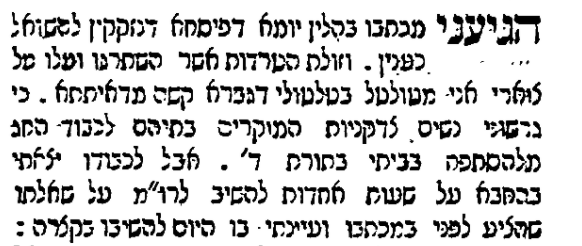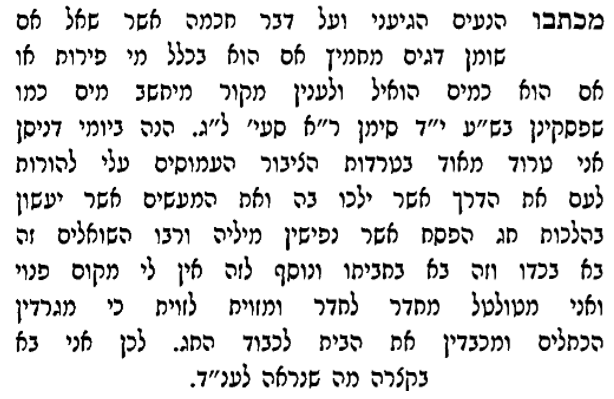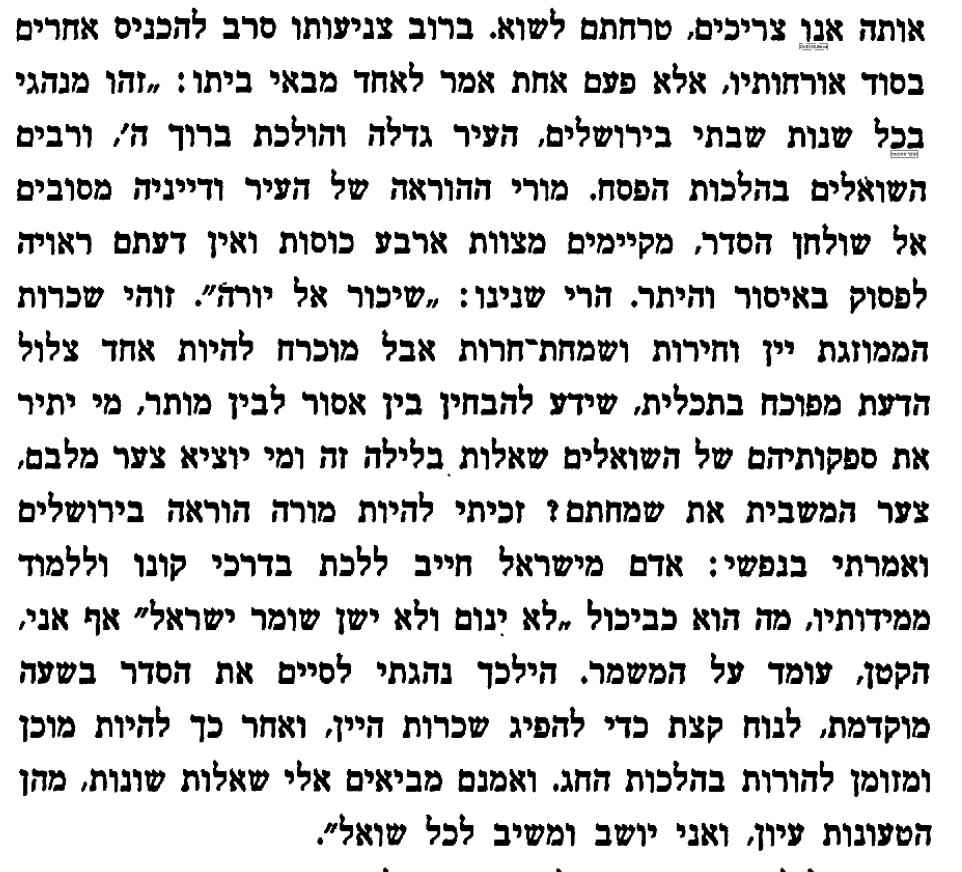Each year at the Pesach seder, many of us share the same stories we have been telling for years. That midrash that the Israelite mothers gave birth to six children at a time in Egypt, or Rabbi Yonatan’s assertion in Sotah that to break their spirits, the Egyptians made the men do the women’s work, and the women perform the men’s. In an effort to encourage something new, we present some unusual material for you to share at your seder. They come from Rabbi Zeev Zuckerman’s אוצר פלאות התורה, שמות, a work that can best be described as a sort of Ripley’s Believe It or Not on the Torah. We hope they add to your special night.
Rashi forgot to eat the Afikoman
The Machzor Vitry is one of the oldest liturgical texts in Judaism. It contains prayers for the entire year, as well as the customs of the Jews of France, a commentary on the Ten Commandments and Pirkei Avot, liturgical poems, and a whole lot more. It was composed in the eleventh century by Rabbi Simcha of Vitry, a French scholar and student of the great Rashi. Buried deep in the Laws of eating the Afikoman is this:
הלכות פסח, ע״ד. שכח מלאכול אפיקומן
From here.
פעם אחת שכח ר' ולא אכל מצה אפיקומן אחר סעודה קודם ברכת המזון. ולאחר ברכת המזון הוזכר. ולא רצה לאכול ממנה. לפי שהיה צריך לברך אחריה ברכת המזון ולשתות מכוס של ברכה. ואי איפשר לשתות בין כוס של מזון לכוס של הלל. דאמור רבנן בין [הכוסות] הללו אם רצה לשתות ישתה בין שלישי לרביעי לא ישתה. ולא רצה לברך עליה ברכת המזון בלא יין לפי שתקנו חכמים כוס שלישי עליה ונראה שהיא צריכה כוס. ואפילו אחר כוס רביעי של הלל לא רצה לאכל מצה ולברך ברכת המזון. מפני שהן לא התקינו אלא ד' כוסות בלבד. אבל חמשה לא התקינו. ועל כן נמנע מלאכול מצה אחר ברכת המזון: והחזיק טעם בדבר זה שאין צריך לחזור ולאכל מצה. מפני שסתם רוב מצות שלנו עשויות כתיקון חכמים ויש בהן שימר לשם מצה. ומצה שאוכל בגמר סעודתו עולה לו לשם מצה של מצוה הואיל ונעשית בה שימור לשם מצה: וכן (נוהג) [נהג] רבינו שלמה מ"כ
Once, R. forgot to eat the Afikoman after the meal, before saying Birkat Hamazon. And after benching he remembered, but didn’t want to go back and eat it.
Who might this mysterious person “R” be? According to Rabbi Zeev Zuckerman, the author of the four volume set Otzar Pilaos Hatorah, R is none other than Rashi. This makes sense, since Rabbi Simcha ben Shmuel of Vitry (d. 1105) was a student of Rashi. And so we have an eyewitness account that the great Rashi himself once forgot to eat the Afikoman!
Machzor Vitry, Golschmidt edition. Vol II page 430, footnote 2.
But not everyone agrees that R was Rashi. Aryeh Goldschmidt published a critical edition of the Machzor Vitry between 2003-2009, and in his commentary he identified R as Rabbi Kalonymous the Elder. This would most likely have been Kalonymus ben Isaac who died in 1126. He was the father of Samuel he-Hasid, and the grandfather of the Judah he-Hasid. Judah was the author of the famous Sefer Hasidim (or at least most of it).
A similar observation was made by Rabbi Mordechai ben Hillel Ashkenazi, known simply as The Mordechai, who was the author of an important legal commentary on the Talmud, and who was murdered in the Rintfleisch pogrom of 1298. Here is his commentary on the Seder, in which he retold the story of Kalonymus forgetting to eat the afikomon:
From Sefer Hamordechai. Vienna 1812. 96a.
For discussion: Have you ever forgotten a critical part of a Jewish ceremony? How did you feel?
There are lots of rules to remember and it is easy to mess up. So forgive yourself if you forget something - you are in good company.
2. When the Chatam Sofer was banished from his Library. by his wife. Twice
The famous Moses Sofer, known as Chatam Sofer, was asked a question by Dayan Yosef Yoel of Ternopil in the Ukraine. The Chatam Sofer gave his answer, but then added this rider:
I have no access to my study, for I have been exiled from it by the pious women who are cleaning for Peseach. Therefore, I could not go into further detail, as would have been expected…
Then it happened again. This time the question was from Rabbi Meir of the Hungarian town of Balassagyarmat (Yarmat in Yiddish). And again, Chatam Sofer gave his answer, but once more he was thwarted by the cleaning efforts going on around him.
Your dear letter recently reached me, but it is a time of lots of moving, because our women have moved things from here and there, and they don’t even allow me access to my books…
It wasn’t just the Chatam Sofer who complained. Rabbi Yaakov Schorr (1852-1923) who lived in Galicia had similar troubles around the Pesach preparations. In his responsa Divrei Yaakov, published in 1881, he seemed to be losing patience:
I received your query on these days leading to Pesach, which required you to ask an appropriate question. But I am overworked, as things pile up around my neck, and I am forced to move from place to place. For to be a man is harder than to be a woman (!), for I have been forced out of my home and the Torah of God, by the pious women who are preparing the house for Pesach. But I secretly stole a few hours to answer you…
The great Rabbi Yechezkel Landa of Prague, known as the Nodah Beyehuda was also a victim of Pesach cleaning. His son asked him whether fish brine was chametz. And here is how he began his answer:
During these days of Nissan I am very busy with the problems of the community, who turn to me with the burden of showing them the proper path forward and how they should follow the many laws of Pesach. One comes with his flask and another with his barrel, and on top of this I have no free place of my own. I wander from room to room and from one corner to another while they scrape the walls and clean the house for Yom Tov. So I must be brief…
Oh, by the way, he ruled that fish brine was indeed chametz. Good to know.
For discussion: There are lots of changes we undertake on Pesach. Do you enjoy them, or find them challenging?
Just go with it. That’s what the Chatam Sofer did.
3. SPARE A THOUGHT FOR THOSE WHO SERVE
As we sit down for our seder, we should spare a thought for those whose own seder must be curtailed because they serve others. There are countless nurses and doctors, soldiers and police, ambulance crews and public servants, (and if you are off to a hotel, lots of wait staff, chefs and servers) who continue to work so that we may recline. Sometimes, even rabbis have to give up their seder to serve others. Shmuel Salant (1816-1909) who served as the Chief Rabbi of Jerusalem for seventy years apparently cut his own seder short, so that he could be ready to help others with their halakhic questions on the first night of Pesach.
From Rimon Y. and Wasserman Y. Shmuel Bedoro. Tel Aviv. Maslul, 1961. 107.
Rabbi Salant was concerned that if he was to drink the four cups of wine, he would not be able to answer any halakhic question that might occur on the Seder night, for a person who has drank wine is forbidden to rule until he sobers up. Consequently, he would have the custom to finish his seder quickly, take a quick nap to sleep off the alcohol, and then wake up ready to answer any questions that might come his way. It’s a charming insight into the life of a public servant, and should remind us to thank all those who toil so that we may enjoy Pesach.
For discussion: There are lots of people who work hard to get us to this night. Spend a moment going around the table to thank them.
And if you are one of those public servants, thank you.
4. MAY a Husband sell Chametz to his non-Jewish wife?
Rabbi Yaakov Jacob ben Joseph Reischer (c.1661–1733) served as a dayyan in Prague, and later served in Worms and Metz. Among his three volumes of responsa is this gem:
In the state where I live there is a Jew who married a Gentile. She follows her own customs in every aspect, while he follows the customs of Israel. What happens to the chametz that is found in the house after Pesach? Is it permissible to be used, since it was the chametz that belonged to a Gentile, or is it forbidden, since a wife’s property also belongs to her husband?
Rabbi Zeev Zuckerman, (from whose work אוצר פלאות התורה, שמות these examples are taken) drew from this responsum an example of the sensitivity with which we should reply to any question, and not disparage the one who asked. I suppose it would have been a better question to ask if a Jewish husband may sell his chametz to his non-Jewish wife, but that wasn’t exactly the question asked of Rabbi Reischer, who ruled that in this case, the chametz was indeed permitted after Pesach.
For discussion: Is there something special about Pesach that resonates with us, even if we are less careful to follow other parts of Jewish practice?
Always be kind to those with a question about Jewish law.
Happy Passover from Talmudology!
Download this post and have it ready to read at your Seder:
Want even more? Then enjoy the Talmudology Passover Reader, first published last year.









